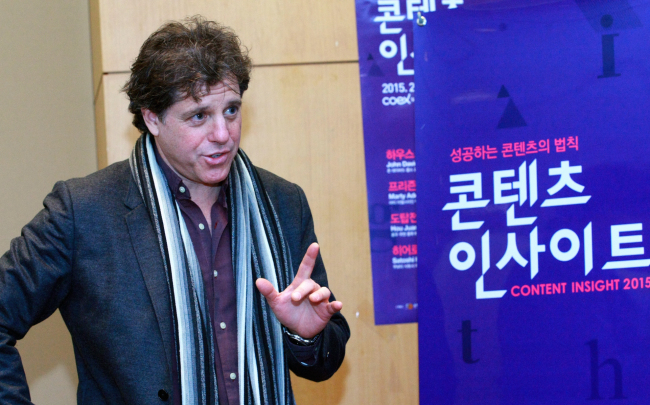Television as modern-day novel
‘House of Cards’ director talks new TV formats, power of ‘binge watching,’ importance of good stories
By Korea HeraldPublished : Feb. 11, 2015 - 18:26
In the U.S., the TV landscape is changing drastically, with the rise of Netflix. Enabled by on-demand Internet streaming, viewers now watch several episodes or perhaps even an entire season of a TV series in one sitting, in a phenomenon called “binge watching.”
John David Coles, a famed TV director who helmed the hit Netflix series “House of Cards,” said the changes are turning the TV viewing experience into something similar to reading a classic novel.
“Television has become something like a 19th century novel; you can sit down with a few chapters, or you can stay up all night,” he said. “An enormous amount of space is given to the viewer to explore the world we have set up. You can really go deep into the characters.”
Coles, whose previous works include “Sex and the City,” “Grey’s Anatomy” and “The West Wing,” made the comments during a news conference in Seoul on Wednesday. He was in town to speak at a forum organized by the state-run Korea Creative Content Agency.
John David Coles, a famed TV director who helmed the hit Netflix series “House of Cards,” said the changes are turning the TV viewing experience into something similar to reading a classic novel.
“Television has become something like a 19th century novel; you can sit down with a few chapters, or you can stay up all night,” he said. “An enormous amount of space is given to the viewer to explore the world we have set up. You can really go deep into the characters.”
Coles, whose previous works include “Sex and the City,” “Grey’s Anatomy” and “The West Wing,” made the comments during a news conference in Seoul on Wednesday. He was in town to speak at a forum organized by the state-run Korea Creative Content Agency.

His most recent work, “House of Cards,” is a political drama that boasts a format that has never been seen before on traditional television. Instead of one or two episodes being released every week, all 13 episodes of each season were released at once.
“It was a gamble on Netflix’s part,” Coles said regarding the Web media company’s bold decision. “It was a brilliant new idea. It opened up new human patterns, so that terms like ‘binge watching’ were created,” he said.
Regarding the universal formula behind successful content, the award-winning director emphasizes the importance of a strong plot.
“The key point in content is always going to be good stories, good stories, good stories,” he stressed. “It is the foundation. Everything is based on that. It doesn’t matter how great the actors are or how beautiful the set is; if the story isn’t great, then it doesn’t work.”
What, then, constitutes a good story? In an era where competition for piloting TV shows has become fierce to the point of impossible, in a fickle industry that relies heavily on popularity, are there any firm standards that prevail?
“Yes,” Coles replied. “For a television drama, I think the main thing you need is a ‘central agitation conflict.’ That is what drives season after season.”
As a key example, he briefly outlined the plot of “House of Cards.” Protagonist Frank Underwood is promised the position of the U.S. Secretary of State. He is denied the job. He seeks revenge. Events unfurl.
“A very simple, clear collision,” Coles said, “is what I think makes for a great series. It’s a simple, strong line that drives us forward. Will he go forward or will he go back? The simpler a story is, the more you can embellish it. When a story is complicated and unclear, that’s when you start to get lost.”
Are there any messages that he would like to put out there that make for more important stories? Does “House of Cards” attempt to deliver any definite morals?
“I think as with any great drama,” Coles said, “there is not one specific message. Harry Warner, a great studio executive of the 1930s, once said, ‘If you have a message, send a telegram.’ The point of art is not to send one message but to open up a bunch of ideas.”
By Rumy Doo (bigbird@heraldcorp.com)
-
Articles by Korea Herald


![[Exclusive] Korean military set to ban iPhones over 'security' concerns](http://res.heraldm.com/phpwas/restmb_idxmake.php?idx=644&simg=/content/image/2024/04/23/20240423050599_0.jpg&u=20240423183955)

![[Graphic News] 77% of young Koreans still financially dependent](http://res.heraldm.com/phpwas/restmb_idxmake.php?idx=644&simg=/content/image/2024/04/22/20240422050762_0.gif&u=)



![[Pressure points] Leggings in public: Fashion statement or social faux pas?](http://res.heraldm.com/phpwas/restmb_idxmake.php?idx=644&simg=/content/image/2024/04/23/20240423050669_0.jpg&u=)










